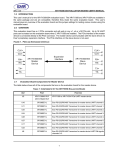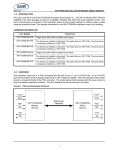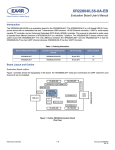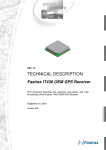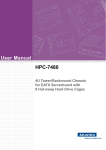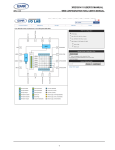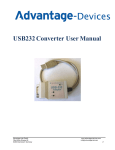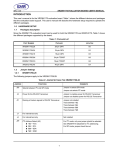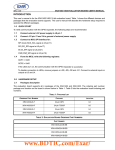Download 1 XR21V1414 EVALUATION BOARD USER`S MANUAL - Digi-Key
Transcript
REV. 1.0.0 XR21V1414 EVALUATION BOARD USER’S MANUAL 1.0 INTRODUCTION This user’s manual is for the XR21V1414 evaluation board. It will describe the hardware setup required to operate the part. 2.0 OVERVIEW The XR21V1414 evaluation board has one 48-TQFP package on it. Figure 1 shows a top view of XR21V1414 evaluation board layout. FIGURE 1. TOP VIEW OF XR21V1414 EVALUATION BOARD LAYOUT 1 XR21V1414 EVALUATION BOARD USER’S MANUAL Figure 2 shows a bottom view of XR21V1414 evaluation board layout. FIGURE 2. BOTTOM VIEW OF XR21V1414 EVALUATION BOARD LAYOUT 2 REV. 1.0.0 XR21V1414 EVALUATION BOARD USER’S MANUAL REV. 1.0.0 2.1 Evaluation Board Components Table 1 below lists some of the components installed on the evaluation boards. The default setting is RS-232 mode. TABLE 1: COMPONENTS OF THE XR21V1414 EVALUATION BOARD UNIT LOCATION PART FUNCTION U1 Top XRP6657IHBTR-F-DFN6 U2 Top AT24C02B-PU-DIP8 U3 Top XR21V1414IM48 U4 Bottom NC7SZ14M5X-SOT-23-5 U5 Bottom SN74LVC2G53DCTR-SM8 Switch UART TXA signal into either RS-232 or RS-485 transceiver. U6 Bottom SN74LVC2G53DCTR-SM8 Switch UART TXB signal into either RS-232 or RS-485 transceiver. U7 Bottom SN74LVC2G53DCTR-SM8 Switch RXA signal from either RS-232 or RS-485 transceiver. U8 Bottom SN74LVC2G53DCTR-SM8 Switch RXB signal from either RS-232 or RS-485 transceiver. U9 Bottom SN74LVC2G53DCTR-SM8 Switch UART TXC signal into either RS-232 or RS-485 transceiver. U10 Bottom SN74LVC2G53DCTR-SM8 Switch UART TXD signal into either RS-232 or RS-485 transceiver. U11 Bottom SN74LVC2G53DCTR-SM8 Switch RXC signal from either RS-232 or RS-485 transceiver. U12 Bottom SN74LVC2G53DCTR-SM8 Switch RXD signal from either RS-232 or RS-485 transceiver. U13 Top SP3245EEY-L-TSSOP-28 Exar’s RS-232 transceiver for channel A. U14 Top SP3245EEY-L-TSSOP-28 Exar’s RS-232 transceiver for channel B. U15 Top SP3245EEY-L-TSSOP-28 Exar’s RS-232 transceiver for channel C. U16 Top SP3245EEY-L-TSSOP-28 Exar’s RS-232 transceiver for channel D. U17 Bottom SN74LVC2G66DCT-SM8 Mutiplexer to select RS-485 direction control signal (RTSA# or DTRA#). U18 Top SP3497EEN-L-NSOIC14 Exar’s RS-485 transceiver for channel A. U19 Bottom SN74LVC2G66DCT-SM8 Mutiplexer to select RS-485 direction control signal (RTSB# or DTRB#). U20 Top SP3497EEN-L-NSOIC14 Exar’s RS-485 transceiver for channel B. U21 Bottom SN74LVC2G66DCT-SM8 Mutiplexer to select RS-485 direction control signal (RTSC# or DTRC#). U22 Top SP3497EEN-L-NSOIC14 Exar’s RS-485 transceiver for channel C. U23 Bottom SN74LVC2G66DCT-SM8 Mutiplexer to select RS-485 direction control signal (RTSD# or DTRD#). Exar’s voltage converter to step down voltage from 5V to 3.3V. I2C EEPROM. Exar’s 4 channel USB UART. Invert LowPower (suspend) signal. 3 XR21V1414 EVALUATION BOARD USER’S MANUAL REV. 1.0.0 TABLE 1: COMPONENTS OF THE XR21V1414 EVALUATION BOARD UNIT LOCATION PART FUNCTION U24 Top SP3497EEN-L-NSOIC14 CON1 Top PJ-002A CON2 Top 690-004-621-023 USB B-Type connector. Communication with USB host (USBD+, USBD-) and power source for evaluation board (VBus). CON3 Top 182-009-113R161 RS-232 mode DB9 male connector for channel A. CON4 Top 182-009-113R161 RS-232 mode DB9 male connector for channel B. CON5 Top 182-009-113R161 RS-232 mode DB9 male connector for channel C. CON6 Top 182-009-113R161 RS-232 mode DB9 male connector for channel D. CON7 Top ED555/4DS RS-485 mode 4X1 terminal block for channel A. CON8 Top ED555/4DS RS-485 mode 4X1 terminal block for channel B. CON9 Top ED555/4DS RS-485 mode 4X1 terminal block for channel C. CON10 Top ED555/4DS RS-485 mode 4X1 terminal block for channel D. Exar’s RS-485 transceiver for channel D. External power input. NOTES:1) An external pull-up is required on the LOWPOWER pin for proper functionality. The external pull-up is not shown in the evaluation board schematics, but has been added on the evaluation board. 2) An external pull-up is required on any GPIO pins that is used as an input. In the suspend mode, the internal pull-up resistor is disabled and the input will be floating if there is no external pull-up resistor. The external pull-ups have not been added to the GPIOs used as inputs on this evaluation board. 4 XR21V1414 EVALUATION BOARD USER’S MANUAL REV. 1.0.0 2.2 Jumper Settings 2.2.1 Common jumpers Common jumpers are those jumpers which should be set the same for both RS-232 and RS-485 mode. The Table 2 shows the common jumpers setting on the evaluation board: TABLE 2: COMMON JUMPERS SETTINGS JUMPERS LOCATION FUNCTIONS COMMENTS JP1 Top Power source select Not installed. Trace between pin 2&3. ■ Jumper in 1&2 selects power from external power supply of 5V ■ Jumper in 2&3 selects power from USB VBUS power JP2 Top SCL pull-up/pull-down resistor select Jumper in 1&2 selects pull-up for SCL Jumper in 2&3 selects pull-down for SCL JP3 Top SDA pull-up/pull-down resistor select Jumper in 1&2 selects pull-up for SDA Jumper in 2&3 selects pull-down for SDA JP4 Top I2C EEPROM header Jumper in 1&2 connects SCL to I2C EEPROM Jumper in 3&4 connects SDA to I2C EEPROM NOTE: I2C EEPROM has not been programmed JP5 Top Selects RS-232 or RS-485 mode for Channel A Jumper in 1&2 selects RS-485 mode Jumper in 2&3 selects RS-232 mode (default) JP6 Top Selects RS-232 or RS-485 mode for Channel B Jumper in 1&2 selects RS-485 mode Jumper in 2&3 selects RS-232 mode (default) JP7 Top Selects RS-232 or RS-485 mode for Channel C Jumper in 1&2 selects RS-485 mode Jumper in 2&3 selects RS-232 mode (default) JP8 Top Selects RS-232 or RS-485 mode for Channel D Jumper in 1&2 selects RS-485 mode Jumper in 2&3 selects RS-232 mode (default) JP25 Top Power supply for XR21V1414 Not installed. Trace between pin 1&2 JP26 Top UART side Channel A external loopback header Jumper in enables external loopback for channel A in the UART side NOTE: External loopback via this jumper can only be performed when the transceiver has been disabled. JP27 Top UART side Channel B external loopback header Jumper in enables external loopback for channel B in the UART side NOTE: External loopback via this jumper can only be performed when the transceiver has been disabled. 5 XR21V1414 EVALUATION BOARD USER’S MANUAL REV. 1.0.0 TABLE 2: COMMON JUMPERS SETTINGS JUMPERS LOCATION JP28 Top FUNCTIONS COMMENTS UART side Channel C external loopback header Jumper in enables external loopback for channel C in the UART side NOTE: External loopback via this jumper can only be performed when the transceiver has been disabled. JP29 Top UART side Channel D external loopback header Jumper in enables external loopback for channel D in the UART side NOTE: External loopback via this jumper can only be performed when the transceiver has been disabled. 2.2.2 Remote wakeup and jumper The SDA and SCL are used to specify whether Remote Wakeup and/or Bus Powered configurations are to be supported. These pins are sampled at power-up. The following Table 3 describes how Remote Wakeup and Bus Powered support. TABLE 3: REMOTE WAKEUP AND POWER MODES SDA SCL REMOTE WAKE-UP SUPPORT POWER MODE COMMENTS 1 1 No Self-Powered Default, if no EEPROM is present 1 0 No Bus-Powered 0 1 Yes Self-Powered 0 0 Yes Bus-Powered The following Table 4 shows jumpers related to remote wakeup. TABLE 4: REMOTE WAKEUP JUMPERS SETTINGS JUMPERS LOCATION FUNCTIONS COMMENTS JP38 Top Select remote control wakeup signal for Jumper in 1&2 selects UART RS-232 transceiver (RI#) Channel A signal Jumper in 2&3 selects push-button SW1 Top Generate remote wakeup signal Push once to generate one remote wakeup signal 6 XR21V1414 EVALUATION BOARD USER’S MANUAL REV. 1.0.0 2.2.3 RS-232 mode jumpers (Default setting is RS-232 mode) The XR21V1414 evaluation board is set in RS-232 mode by default. The following Table 5 jumper settings apply to the RS-232 mode: TABLE 5: JUMPER SETTINGS FOR RS-232 MODE JUMPERS LOCATION JP30 Top Power supply for RS-232 transceiver of Channel A Not installed. Trace between pin 1&2 JP31 Top Power supply for RS-232 transceiver of Channel B Not installed. Trace between pin 1&2 JP32 Top Power supply for RS-232 transceiver of Channel C Not installed. Trace between pin 1&2 JP33 Top Power supply for RS-232 transceiver of Channel D Not installed. Trace between pin 1&2 2.2.4 FUNCTIONS COMMENTS RS-485 mode jumpers The following Table 6 jumper setting applies to the RS-485 mode: TABLE 6: JUMPER SETTINGS FOR RS-485 MODE JUMPERS LOCATION FUNCTIONS COMMENTS JP34 Top Power supply for RS-485 transceiver of Channel A Not installed. Trace between pin 1&2 JP9 Top Select Channel A RTS or DTR direction control for TX Jumper in 1&2 selects RTS based direction control for TX Jumper in 2&3 selects DTR based direction control for TX JP10 Top Select Channel A direction control for RX Jumper in 1&2 selects common direction control for and TX or always for RX RX and TX Jumper in 2&3 enables RX always JP11 Top Channel select for half duplex or full duplex mode Jumper in 1&2 selects for half duplex mode Jumper in 2&3 selects for full duplex mode JP12 Top Channel select for half duplex or full duplex mode Jumper in 1&2 selects for half duplex mode Jumper in 2&3 selects for full duplex mode JP35 Top Power supply for RS-485 transceiver of Channel B Not installed. Trace between pin 1&2 JP13 Top Select Channel B RTS or DTR direction control for TX Jumper in 1&2 selects RTS based direction control for TX Jumper in 2&3 selects DTR based direction control for TX JP14 Top Select Channel B direction control for RX Jumper in 1&2 selects common direction control for and TX or always for RX RX and TX Jumper in 2&3 selects common direction control for RX always JP15 Top Channel B select for half duplex or full duplex mode 7 Jumper in 1&2 selects for half duplex mode Jumper in 2&3 selects for full duplex mode XR21V1414 EVALUATION BOARD USER’S MANUAL REV. 1.0.0 TABLE 6: JUMPER SETTINGS FOR RS-485 MODE JUMPERS LOCATION FUNCTIONS COMMENTS JP16 Top Channel B select for half duplex or full duplex mode Jumper in 1&2 selects for half duplex mode Jumper in 2&3 selects for full duplex mode JP36 Top Power supply for RS-485 transceiver of Channel C Not installed. Trace between pin 1&2 JP17 Top Select Channel C RTS or DTR direction control for TX Jumper in 1&2 selects RTS based direction control for TX Jumper in 2&3 selects DTR based direction control for TX JP18 Top Select Channel C direction control for RX Jumper in 1&2 selects common direction control for and TX or always for RX RX and TX Jumper in 2&3 selects common direction control for RX always JP19 Top Channel C select for half duplex or full duplex mode Jumper in 1&2 selects for half duplex mode Jumper in 2&3 selects for full duplex mode JP20 Top Channel C select for half duplex or full duplex mode Jumper in 1&2 selects for half duplex mode Jumper in 2&3 selects for full duplex mode JP37 Top Power supply for RS-485 transceiver of Channel D Not installed. Trace between pin 1&2 JP21 Top Select Channel D RTS or DTR direction control for TX Jumper in 1&2 selects RTS based direction control for TX Jumper in 2&3 selects DTR based direction control for TX JP22 Top Select Channel D direction control for RX Jumper in 1&2 selects common direction control for and TX or always for RX RX and TX Jumper in 2&3 selects common direction control for RX always JP23 Top Channel D select for half duplex or full duplex mode Jumper in 1&2 selects for half duplex mode Jumper in 2&3 selects for full duplex mode JP24 Top Channel D select for half duplex or full duplex mode Jumper in 1&2 selects for half duplex mode Jumper in 2&3 selects for full duplex mode 3.0 DRIVERS AND SUPPORT For any questions about this evaluation board, software drivers or technical support, send an e-mail to [email protected]. 8 REV. 1.0.0 XR21V1414 EVALUATION BOARD USER’S MANUAL NOTICE EXAR Corporation reserves the right to make changes to the products contained in this publication in order to improve design, performance or reliability. EXAR Corporation assumes no responsibility for the use of any circuits described herein, conveys no license under any patent or other right, and makes no representation that the circuits are free of patent infringement. Charts and schedules contained here in are only for illustration purposes and may vary depending upon a user’s specific application. While the information in this publication has been carefully checked; no responsibility, however, is assumed for inaccuracies. EXAR Corporation does not recommend the use of any of its products in life support applications where the failure or malfunction of the product can reasonably be expected to cause failure of the life support system or to significantly affect its safety or effectiveness. Products are not authorized for use in such applications unless EXAR Corporation receives, in writing, assurances to its satisfaction that: (a) the risk of injury or damage has been minimized; (b) the user assumes all such risks; (c) potential liability of EXAR Corporation is adequately protected under the circumstances. Copyright 2009 EXAR Corporation Datasheet July 2009. Send your UART technical inquiry with technical details to hotline: [email protected]. Reproduction, in part or whole, without the prior written consent of EXAR Corporation is prohibited. 9










